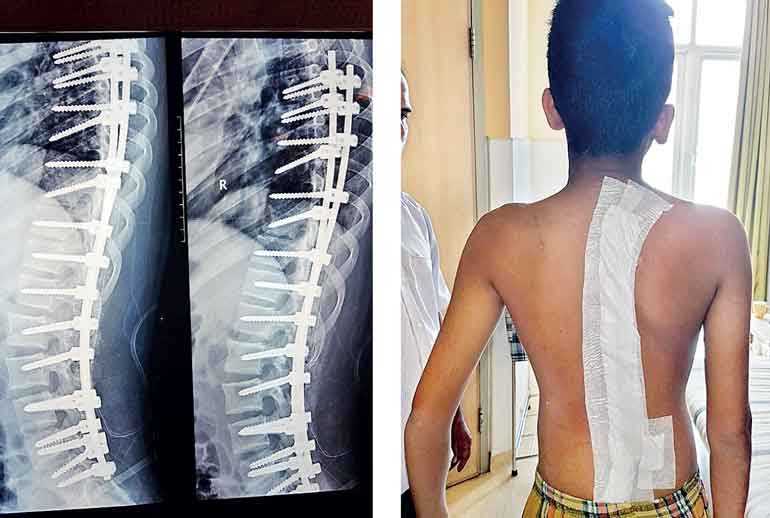Saturday Feb 28, 2026
Saturday Feb 28, 2026
Tuesday, 15 May 2018 00:00 - - {{hitsCtrl.values.hits}}

Lasindu Perera, a 16-year old teenager received the gift of life-changing scoliosis surgery recently, performed by the ‘Brain and Spine’ Team of Asiri Central Hospital, Colombo.
Creating a major milestone in medical history this was the first time, a neurosurgical team headed by eminent Consultant Surgeon Dr. Sunil Perera undertook such a procedure.
Lasindu’s severe scoliosis or an abnormal curvature of the spine posed serious health risks restricting movement and activity for the boy requiring immediate remedial surgery.
However, this was not the first time Dr. Perera and his team had intervened to save Lasindu’s life. In September 2016 the teen experienced partial paralysis, and after investigations by Dr. Perera was diagnosed with a large tumour on the left side of his brain near the thalamus and brain-stem, a dangerous place.
“He had a tumour in a very dangerous place, not usually accessible. If we had only given him radio therapy the child would not be living today. Everyone refused to perform the surgery. We got him here and we did the surgery and the child recovered well,” Dr. Perera said.
Dr. Perera’s next encounter with the teen was in January 2018 when Lasindu’s physiotherapist consulted the doctor seeking advice on the boy’s growing curvature.
According to Dr. Perera, a cobb-angle or lateral bending of the spine of over 10-degrees would indicate scoliosis and require treatment beginning with wearing a brace for nearly 23 hours to stop the progression of the spinal curve. Lasindu was diagnosed with a cobb-angle of 70-degrees.
“You try to correct it with the brace without surgery but the deformity was so bad and very ugly. Secondly as the centre of gravity is completely different, the curvature continues to grow over a period of time,” he added.
In Lasindu’s case his previous illness created further complications. Dr. Perera explained, “Unfortunately because of his earlier surgery, his spine was getting worse and he was walking with a little odd gait. It was getting worse and that is why we decided on doing the surgery.”
Despite a surgery of this nature being riddled with complications, Asiri Central’s neurosurgical team decided to go ahead.
Explaining the procedure Dr. Perera said, “We chipped in because it is a difficult surgery and a dangerous one as well. Dangerous because when you are putting the screws if you put it into the wrong place the spinal cord can be damaged resulting in paralysis. Secondly when you are trying to move the spine and bring it to the mid line, the movement alone can cause damage to the spinal cord.”
For the complex surgery, Dr. Perera tasked a separate team to monitor Lasindu’s nervous system. “While we were operating we had to monitor the nervous system. Monitors from the top down to the toes where every second there is a signal that passes to the brain to the toes and if there is any disruption then you know.”
Post-surgery, Lasindu has been cured and will soon resume normal school activities. “It went well and the child has gone home,” Dr. Perera noted.
Commenting on prevalence of scoliosis in the country, Dr. Perera noted, “Statistically the incidence is about 3% of the population. We definitely need to do about 1000-2000 such surgeries unlike the 30 that is being conducted now. A large amount of patients are being taken to India and other countries to do the surgery.”
He commended Dr. Vasantha Perera, Orthopaedic Surgeon who had previously initiated scoliosis surgeries in Sri Lanka and also Dr. Randunna Corera who performs the surgery via a different method.
“Surgically this has been done before. This was done by previous surgeons. By Dr. Randunna Corera, who used a different type of approach and by Dr. Vasantha Perera who has been doing it for the past 15 years. But the crux of it is that this is the first time a neurosurgical team has done it. It is high technology as well as very dangerous surgery.”
Dr. Perera also stressed the importance of educating the population on scoliosis and the available treatment. He noted “This is common in the periphery. They know that they have a problem but they don’t know where to go. We need to create awareness.”